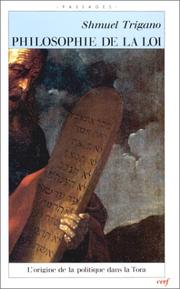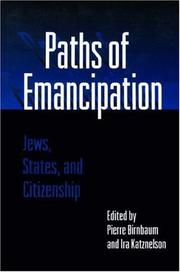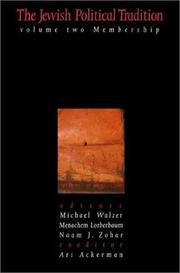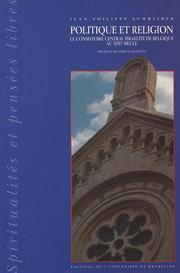| Listing 1 - 5 of 5 |
Sort by
|
Book
ISBN: 9782805920080 Year: 2012 Volume: 28 Publisher: Bruxelles Aden
Abstract | Keywords | Export | Availability | Bookmark
 Loading...
Loading...Choose an application
- Reference Manager
- EndNote
- RefWorks (Direct export to RefWorks)
Constantin Brunner (1862-1937) fut non seulement un philosophe original mais aussi l'analyste le plus profond des phénomènes de la haine vouée aux Juifs, de la montée de l'antisémitisme politique et du national-socialisme. Allemand d'origine juive, comme il se définissait lui-même, il préconisa sous la république de Weimar l'unité des Allemands, juifs et non juifs, contre ces dangers menaçant le fragile État démocratique. Aux Juifs, il demandait une participation active à leur propre émancipation, considérant le sionisme comme une réponse inappropriée, étrangère à l'histoire allemande et de nature à diviser davantage encore les communautés juives, les écartant de leur objectif commun : la défense contre l'exclusion politique et sociale. Sa doctrine universaliste et sa rigueur de pensée mettent en cause la confusion dans laquelle baignaient, à ses yeux, ces Allemands d'origine juive, prisonniers de leurs mythes anciens, athées, agnostiques ou peu religieux pour nombre d'entre eux, mais encore imprégnés dans leur ensemble par une religion nationale qui fut, des siècles durant, le subtstitut de l'antique nation disparue. Cette analyse lucide n'a, sous bien des aspects, rien perdu de son actualité, même si, en réaction à l'émotion du judéocide que Brunner n'a pas vécu, l'État d'Israël, qu'il regardait comme une utopie lourde de menaces, a vu le jour en 1948. Il n'est pas certain que la victoire si chèrement acquise sur le nazisme nous permette même aujourd'hui un accès aisé à la pensée de Brunner. Qui, Allemands, Israéliens, Français ? auxquels Brunner est encore si peu accessible ?, Européens, Juifs dispersés dans le monde, peut s'ouvrir à lui sans anachronisme et retenir de ses réflexions l'essentiel, l'universalisme et la réciprocité des principes, si nécessaires à la construction d'une société multiculturelle débarrassée du racisme et de tous ses préjugés ?
Jodendom en filosofie --- Jodendom en staat --- Judaism and philosophy --- Judaism and state --- Judaïsme et Etat --- Judaïsme et philosophie --- Judaism and politics --- Zionism and judaism --- Judaïsme et politique --- Sionisme --- Aspect religieux --- Judaïsme --- Judaïsme et philosophie --- Judaïsme et politique --- Judaïsme --- Zionism and Judaism.

ISBN: 2204044342 9782204044349 Year: 1991 Volume: vol *12 Publisher: Paris: Cerf,
Abstract | Keywords | Export | Availability | Bookmark
 Loading...
Loading...Choose an application
- Reference Manager
- EndNote
- RefWorks (Direct export to RefWorks)
Politics --- Jewish religion --- Droit juif --- Jewish law --- Jodendom en politiek --- Jodendom en staat --- Joods recht --- Judaism and politics --- Judaism and state --- Judaïsme et Etat --- Judaïsme et politique --- Judaism --- Judaïsme --- Judaism. --- Philosophy. --- 221.08*2 --- Theologie van het Oude Testament: moraal; ethica; juridica Israelis; vroomheid --- 221.08*2 Theologie van het Oude Testament: moraal; ethica; juridica Israelis; vroomheid --- Judaïsme --- Jews --- Religions --- Semites --- Philosophy --- Religion --- Jewish law - Philosophy.

ISBN: 0691034613 0691034605 0691607826 140086397X 9781400863976 1306984645 9780691034614 9780691607825 Year: 1995 Publisher: Princeton, New Jersey : Princeton University Press,
Abstract | Keywords | Export | Availability | Bookmark
 Loading...
Loading...Choose an application
- Reference Manager
- EndNote
- RefWorks (Direct export to RefWorks)
Throughout the nineteenth century, legal barriers to Jewish citizenship were lifted in Europe, enabling organized Jewish communities and individuals to alter radically their relationships with the institutions of the Christian West. In this volume, one of the first to offer a comparative overview of the entry of Jews into state and society, eight leading historians analyze the course of emancipation in Holland, Germany, France, England, the United States, and Italy as well as in Turkey and Russia. The goal is to produce a systematic study of the highly diverse paths to emancipation and to explore their different impacts on Jewish identity, dispositions, and patterns of collective action.Jewish emancipation concerned itself primarily with issues of state and citizenship. Would the liberal and republican values of the Enlightenment guide governments in establishing the terms of Jewish citizenship? How would states react to Jews seeking to become citizens and to remain meaningfully Jewish? The authors examine these issues through discussions of the entry of Jews into the military, the judicial system, business, and academic and professional careers, for example, and through discussions of their assertive political activity.In addition to the editors, the contributors are Geoffrey Alderman, Hans Daalder, Werner E. Mosse, Aron Rodrigue, Dan V. Segre, and Michael Stanislawski.Originally published in 1995.The Princeton Legacy Library uses the latest print-on-demand technology to again make available previously out-of-print books from the distinguished backlist of Princeton University Press. These editions preserve the original texts of these important books while presenting them in durable paperback and hardcover editions. The goal of the Princeton Legacy Library is to vastly increase access to the rich scholarly heritage found in the thousands of books published by Princeton University Press since its founding in 1905.
Jodendom en staat --- Judaism and state --- Judaïsme et Etat --- Jews --- Juifs --- Judaisme et Etat --- Emancipation --- Legal status, laws, etc --- Identity --- Droit --- Identité --- Judaism and state. --- Emancipation. --- Legal status, laws, etc. --- Identity. --- Identité --- State and Judaism --- Identity, Jewish --- Jewish identity --- Jewishness --- Jewish refugees --- Law --- Disabilities, Political --- Emancipation of Jews --- Jewish emancipation --- Political disabilities --- Ethnic identity --- Race identity --- State, The --- Jewish law --- Jewish nationalism --- Persecutions --- History --- Jews - Legal status, laws, etc.

ISBN: 0300094280 9780300102017 9780300115734 0300078226 Year: 2000
Abstract | Keywords | Export | Availability | Bookmark
 Loading...
Loading...Choose an application
- Reference Manager
- EndNote
- RefWorks (Direct export to RefWorks)
-Judaism and politics --- Judaism and state --- -Ability --- State and Judaism --- Politics and Judaism --- -State and Judaism --- Jodendom en politiek --- Jodendom en staat --- Judaism and politics --- Judaïsme et Etat --- Judaïsme et politique --- Judaism and politics. --- Judaism and state. --- Judaïsme et politique --- Judaisme et Etat --- Jews --- Leadership --- Juifs --- Politics and government. --- Religious aspects --- Judaism. --- Politique et gouvernement --- State, The --- Judaism --- Political science --- Ability --- Command of troops --- Followership --- Hebrews --- Israelites --- Jewish people --- Jewry --- Judaic people --- Judaists --- Ethnology --- Religious adherents --- Semites --- Politics and government --- -Judaism --- Political aspects --- Sociology of minorities --- Political philosophy. Social philosophy --- Jewish religion --- -Politics and government

ISBN: 2800411031 9782800411033 Year: 1995 Volume: 3 Publisher: Bruxelles Éditions de l'Université de Bruxelles
Abstract | Keywords | Export | Availability | Bookmark
 Loading...
Loading...Choose an application
- Reference Manager
- EndNote
- RefWorks (Direct export to RefWorks)
History of Belgium and Luxembourg --- Jewish religion --- anno 1800-1899 --- Jodendom --- Jodendom en politiek --- Jodendom en staat --- Judaism and politics --- Judaism and state --- Judaïsme --- Judaïsme et Etat --- Judaïsme et politique --- Politiek --- Politique --- Judaism --- Jews --- Juifs --- History --- Histoire --- Consistoire central israélite de Belgique --- Histoire des religions --- --Belgique --- --Judaïsme --- --1830-1914 --- --Consistoire central --- --History --- Belgium --- Ethnic relations --- -Judaism --- -#BUAR:bibl.de Bock --- 296 <493> --- Religions --- Semites --- Hebrews --- Israelites --- Jewish people --- Jewry --- Judaic people --- Judaists --- Ethnology --- Religious adherents --- -History --- -Judaïsme. Jodendom--België --- Religion --- Consistoire central israelite de Belgique --- -Centraal Israëlitisch Consistorie van België --- C.I.C.B. --- CICB --- -Belgium --- -Jews --- -History of Belgium and Luxembourg --- Judaïsme --- Consistoire central israélite de Belgique --- Belgique --- België --- Bélgica --- Royaume de Belgique --- Belgii︠a︡ --- Kingdom of Belgium --- Koninkrijk van België --- Königreich Belgien --- Bèlgia --- Koninkryk van België --- Königriich Belgie --- Koninkrijk België --- Belgice --- Belgice Cynerīce --- بلجيكا --- Baljīkā --- مملكة بلجيكا --- Mamlakat Baljīkā --- Belchica --- Reino de Belchica --- Belghia --- Vãsilia di Belghia --- Royômo de Bèlg·ique --- Bélxica --- Reinu de Bélxica --- Bilkiya --- Bilgasuyu --- Bilhika Qhapaqsuyu --- Belçika --- Belçika Krallığı --- Бельгия --- Бельгия Короллеге --- Belʹgii︠a︡ Korollege --- Бельгія --- Belʹhii︠a︡ --- Каралеўства Бельгія --- Karaleŭstva Belʹhii︠a︡ --- Belhika --- Bäigien --- Kinigraich Bäigien --- Belgija --- Kraljevina Belgija --- Белгия --- Regne de Bèlgica --- Бельги --- Belʹgi --- Belgické království --- Gwlad Belg --- Teyrnas Gwlad Belg --- Belgien --- Kongeriget Belgien --- Bélgii Bikéyah --- Belgiska --- Kralojstwo Belgiskej --- Belgia Kuningriik --- Βέλγιο --- Velgio --- Βασίλειο του Βελγίου --- Vasileio tou Velgiou --- Reino de Bélgica --- Belgio --- Reĝlando Belgio --- Belgujo --- Belgika --- Belgje --- Belgjo --- Belgjiche --- Bheilg --- Ríocht na Beilge --- Velg --- Reeriaght ny Belg --- Belgiya --- Rìoghachd na Beilge --- Pí-li-sṳ̀ --- Belʹjmudin Nutg --- Pelekiuma --- Regno del Belgio --- בלגיה --- Belgiyah --- ממלכת בלגיה --- Mamlekhet Belgiyah --- Belgijskô --- Pow Belg --- Ruwvaneth Belgek --- Ububiligi --- Ububirigi --- Igihugu cyʼUbubirigi --- Ubelgiji --- Ufalme wa Ubelgiji --- Belezi --- Nsi ya ntotila ya Belezi --- Bèljik --- Beljika --- Beļgeja --- Beļg̓ijas Karaliste --- Belsch --- Kinnekräich Belsch --- Belgijos Karalystė --- Belsj --- Keuninkriek Belsj --- Beldjym --- Belga Királyság --- Белгија --- ベルギー --- Berugī --- #BUAR:bibl.de Bock --- Judaïsme. Jodendom--België --- Centraal Israëlitisch Consistorie van België --- 19th century --- Reform Judaism --- --1830-1914, --- Consistoire central --- Judaism - Belgium - History - 19th century. --- Jews - Belgium - History - 19th century. --- Belgium - Ethnic relations - History - 19th century. --- BELGIQUE --- ISRAEL --- RELIGION JUIVE --- JUDAISME --- HISTOIRE RELIGIEUSE --- 19E-20E SIECLES --- ISRAELITES --- 20E SIECLE --- 19E SIECLE --- HISTOIRE --- 19E-20E SIECLE --- ppolitique et religion --- le consistoire central israélite de Belgique au XIXe siècle --- émigration --- l'histoire du peuple juif --- le judaïsme --- la modernité --- le judaïsme belge
| Listing 1 - 5 of 5 |
Sort by
|

 Search
Search Feedback
Feedback About UniCat
About UniCat  Help
Help News
News